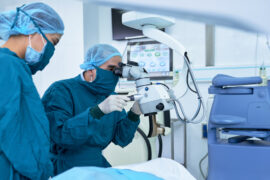What Are the Different Types of Cataracts?
Posted by: Associates in Ophthalmology (NJ) in Cataracts
Cataracts affect millions of people worldwide, but many people don’t realize there are actually several different types of this common eye condition. Cataracts can develop for different reasons and in different parts of the eye’s lens, affecting your vision in unique ways. Keep reading to learn more about the main types of cataracts and how…
Read MoreAre Untreated Cataracts Dangerous?
Posted by: Associates in Ophthalmology (NJ) in Cataracts
Cataracts are a common vision condition that often develops as people age. They can impact your vision, making it seem like you see the world through a fogged-up window. But do cataracts go away on their own? And when should you seek treatment? Keep reading to learn more about whether untreated cataracts are dangerous and…
Read MoreHow Long is the Recovery Time After Cataract Surgery?
Posted by: Associates in Ophthalmology (NJ) in Cataracts
Vision problems from cataracts can be frustrating and challenging to live with, especially as they continue to worsen over time. Cataract surgery is the only way to restore clear vision and eliminate those frustrations. Although undergoing any procedure can sound intimidating, cataract surgery is one of the most commonly performed procedures in the United States…
Read MoreWhat Are The Benefits Of The PanOptix Trifocal IOL?
Posted by: Associates in Ophthalmology (NJ) in Cataracts
If you have cataracts, you’re likely aware of how they can make life more difficult by impairing your vision. It can be stressful and even dangerous when you struggle to read, drive, and perform other tasks. They will worsen with time, and eventually, glasses and contacts might not be enough to maintain quality vision. With…
Read MoreChoosing The Right Surgeon For Cataract Surgery
Posted by: Associates in Ophthalmology (NJ) in Cataracts
When you have a vision problem, you want to find an eye doctor you can trust to diagnose and treat the issue. It’s always important to have a good relationship with your ophthalmologist and to feel comfortable with them. Plus, you want to know they are qualified and trustworthy in their field. While this is…
Read MoreEarly Signs of Cataracts You Shouldn’t Ignore
Posted by: Associates in Ophthalmology (NJ) in Cataracts
As you age, the lenses in your eyes can begin to develop cloudy areas called cataracts. Cataracts can develop painlessly over many years and cause vision problems if left untreated. Knowing the early signs of cataracts can help you get timely treatment to preserve your sight. Keep reading to learn about the early signs of…
Read MoreWhat Qualifications Does the Best Cataract Surgeon Have?
Posted by: Associates in Ophthalmology (NJ) in Cataracts
Finding the right cataract surgeon is vital to having a good outcome after cataract surgery. Trusting someone with your vision is not easy, so you want to ensure they are the best choice. An uninformed decision could put your sight at risk. It’s important to ask yourself and your potential cataract surgeon these questions when…
Read MoreWill I Recover More Quickly After Laser Cataract Surgery?
Posted by: Associates in Ophthalmology (NJ) in Cataracts
Cataracts usually begin to develop in people in their fifties. They are a natural part of the aging process in the eye, so there is not much you can do to prevent them. The best way to restore vision affected by cataracts is through cataract surgery. At Associates in Ophthalmology, our cataract surgeons offer both…
Read More3 Signs You May Want to Consider Cataract Surgery
Posted by: Associates in Ophthalmology (NJ) in Cataracts
As you get older, it’s natural for your vision to lose the clarity that it once had. That’s why it’s essential to get regular eye exams to keep your eyes healthy and prevent any vision loss. Cataracts are one of those leading causes of vision loss. As your eyes age naturally, the clear lens hardens…
Read MoreCan I Use My FSA to Pay For a Premium Lens?
Posted by: Associates in Ophthalmology (NJ) in Cataracts
Is your vision beginning to grow dimmer and duller due to cataracts? If you have cataracts and they’re starting to interfere with your daily life, it’s time for cataract surgery. This is an exciting time for you. Since cataracts began to grow in your eyes, they have slowly degraded your vision. Over time they block…
Read MoreRead What People Are Saying











